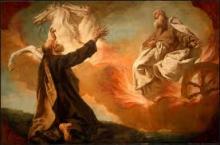There is an old phrase from the midrashic tradition of Jewish storytelling that goes, "When the Messiah comes all prayers will be abolished except one: The prayer of gratitude". In order to understand the true gravity of this sentiment, one must first understand the Jewish version of the messianic age and the purpose of prayer in Judaism. This takes some study, as the most pervasive philosophy of a Messiah and the function of prayer in Western religion differs from Jewish theology greatly.
To approach the topic of the messianic age in Judaism, it is best to start with the concept of Elijah, perhaps the most revered Jewish prophet next to Moses. Elijah is a deeply symbolic figure, featured in many places throughout Jewish ritual to indicate one of many different concepts, all united by the pursuit of total peace that is central to Jewish philosophy. As the story goes, Elijah is supposed to return to the realm of the living to herald the coming of the Messiah and thus the beginning of an age of unbroken peace. It is important that Elijah precedes the Messiah because, as is often the case in the Jewish approach to figures of power and authority, it is contradictory for a truly holy individual to announce his or her self as that would be immodest.
The nature of the Messiah is entirely mysterious. Even the term itself, derived from the Hebrew word Mashiakh (lit. "anointed one") makes no indication about what form the Messiah will take. Though if one understands the requirements for the appearance of the Messiah in Judaism, one knows that form or even function are irrelevant.
This is because the conditions for the return of Elijah and the appearance of the Messiah are for the people of the world to have already achieved Tikun Olam, the repair of everything. This is an ideal state of peace in which there is no injustice left in the world. Elijah and the Messiah are then mere indications that paradise has been created, or rather returned to, by those who could easily choose not to maintain the peace. It is not the Messiah who perfects the world, but the normal people who live in it every day.
So, when we read that midrashic phrase, we can begin to see the depth of its meaning. Most Jewish prayers are an entreaty to make and expand peace, to bring comfort to those who suffer and to remember the importance of diligent uprightness. Upon achieving Tikun Olam there would simply be no need for these reminders. They will have become second nature. All that would remain would be to look on the harmony of the world and be thankful for it, to see goodness and know that it is hard-won wherever it exists.
